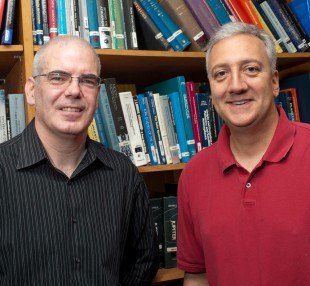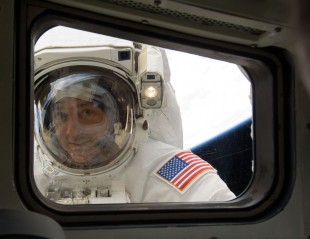David Alexander, Mike Massimino to lead retooled center at Rice University
Rice University solar physicist David Alexander has been named director of the Rice Space Institute (RSI), which coordinates the university’s space-related research, education and outreach programs.
The institute is strengthening its collaborations with NASA; as part of that effort, astronaut Mike Massimino, on loan from NASA’s Johnson Space Center (JSC), has joined RSI as executive director.
Alexander takes over for longtime director Patricia Reiff. Both are professors of physics and astronomy at Rice. Reiff will remain with RSI as associate director of outreach programs.
“By sharing the leadership among research enhancements, NASA cooperative efforts and outreach, we’ll be able to do far more than before,” Reiff said. “David has already proven his vision and energy, and having Mike on board is very exciting.”

David Alexander, left, has been named director and Mike Massimino, right, executive director of the Rice Space Institute. The institute enhances research efforts and cooperation with NASA Johnson Space Center and coordinates public outreach activities. Photo by Jeff Fitlow
Last September, the institutions signed the Rice-NASA Space Act Agreement to streamline educational and research collaborations. The signing came during the university’s NASAversary, which celebrated the 50th anniversary of Houston’s selection as the site of the Manned Spacecraft Center, now JSC, built on land donated by Rice.
Retooling RSI is a way to meet the new collaboration’s goals, Alexander said. “We want strong partnerships with NASA and other local space efforts, and we need a healthy and vital research environment at Rice that takes advantage of those connections,” he said. “We compete with the best universities in the country to attract the best students. If the connections we have forged with NASA JSC leads students to choose Rice over our competitors, we’ve succeeded.”
Alexander said RSI’s immediate goal is to increase awareness about the broad scope of space-related research at Rice. That includes solar, space, Earth, astronomical and life sciences; materials, nanotechnology, electronics and robotics research; national and international policy studies through the Baker Institute for Public Policy, and work at the National Space Biomedical Research Institute, based at Rice’s BioScience Research Collaborative.
“NASA has been a strong partner for 50 years. We want to strengthen our institutional collaboration with Johnson Space Center to bring together complementary expertise,” Alexander said.
“In addition to providing focus and points of contact, the institute will make us aware, on a regular basis, of engineering and science activities at Rice,” said Kamlesh Lulla, director of the University Research, Collaborations and Partnership Office at JSC. Lulla said he’s particularly interested in biomedical and biosensor devices, green energy technologies and “areas of research that will help us propel faster and better.”

Astronaut Mike Massimino smiles at his crewmates inside the shuttle during one of two spacewalks to repair the Hubble Space Telescope in 2009. Massimino, on loan from NASA, has been named executive director of Rice University's Rice Space Institute. Photo courtesy of NASA
Massimino, a veteran of two shuttle missions to repair the Hubble Space Telescope, will help solidify links to JSC as RSI’s first executive director. Massimino, an adjunct professor of mechanical engineering and materials science at Rice since 2004, has joined the university full time for a year under NASA’s Executive on Loan program.
“My job usually gives me good access to facilities at NASA, so I see my role as helping to build relationships,” Massimino said. “NASA is supporting this arrangement at its highest level, at JSC in particular. They know it’s a great opportunity to build a strong relationship with a school that’s one of the best in the world.”
“Having Mike, one of our most experienced astronauts, work with the university will be a great opportunity for both organizations to exchange ideas and share expertise, furthering our mutual goals of understanding the universe,” said Peggy Whitson, chief of NASA’s Astronaut Office and a veteran of two missions to the International Space Station, the second as commander. Whitson earned her doctorate at Rice and is an adjunct professor of biochemistry and cell biology.
“Mike understands the opportunities and needs of both NASA and academia and will help us identify the unique role Rice can play in these arenas,” said Daniel Carson, dean of Rice’s Wiess School of Natural Sciences, the Schlumberger Chair of Advanced Studies and Research and a professor of biochemistry and cell biology.
Massimino has become the public face of NASA since his last mission to the Hubble in May 2009, one of the riskiest ever. On that mission he not only became the first astronaut to send messages via Twitter from space but also gained notoriety when, during a spacewalk, he ripped a stuck handle from the space telescope to gain access to an instrument due to be repaired.
Since returning to Earth, Massimino has appeared on a number of talk shows and hosted a NASA-produced series of videos, “Inside the International Space Station.”
George Abbey, the Baker Botts Senior Fellow in Space Policy at Rice’s Baker Institute for Public Policy, said Massimino is “a great asset” and noted, “He’s a great individual and we’re really fortunate to have him.” Abbey joined NASA as an engineer during the Apollo era; as director of JSC, he served as Massimino’s boss.
Abbey said RSI is “going to really reinvigorate Rice’s involvement in space activities. David will have a very active Rice Space Institute, and I think that’s going to be good for Rice and good for our relationship with NASA.”
Rice and NASA share a history of collaboration that goes back to the early 1960s and President John F. Kennedy’s famous “we choose to go to the moon” speech at Rice Stadium. Several Rice-built experiments went to the moon with Apollo, and a Rice emeritus professor, Robert O’Dell, was the original chief scientist on the Hubble Telescope.
Public outreach will continue to be an important aspect of RSI under Reiff, who earned her Ph.D. at Rice analyzing data from Apollo experiments and co-produces planetarium films with the Houston Museum of Natural Science (HMNS). Through RSI, Reiff will coordinate such public activities as the highly successful annual Sally Ride Science Festival, the many Discovery Dome outreach events and the Space Frontiers Lecture Series.


Leave a Reply